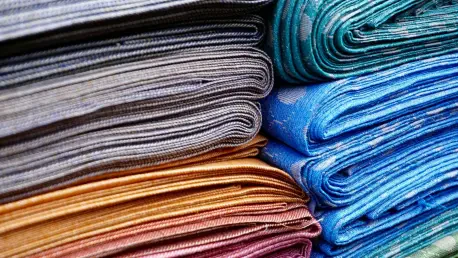In a bold move towards reshaping its textile industry, Africa is witnessing the launch of the “Africa Textile Renaissance Plan,” a tenacious $5 billion initiative aimed at revolutionizing the sector. At the heart of this ambitious drive is the collaboration between Afreximbank, Arise Integrated Industrial Platforms (IIP), and the Swiss technology giant Rieter. Unveiled at Afreximbank’s 32nd Annual Forum in Abuja, the plan envisions a thriving textile plant in Nigeria likely to reduce the country’s textile imports by a staggering $4.7 billion each year. This monumental project is poised not only to fortify Nigeria’s economy by creating approximately 250,000 jobs but also to stimulate the broader African textile industry by ramping up cotton processing capabilities. With a focus on industrialization as a core element of economic policy, this initiative marks a significant pivot towards leveraging Africa’s plentiful natural resources, bolstering its workforce, and reviving an industry that has long been dormant.
The Road to Reinventing Africa’s Industrial Base
As part of an overarching economic transformation initiative, Afreximbank’s strategic plan aligns with its vision of substantially enhancing Africa’s cotton processing. Intending to escalate processing capacity to 500,000 metric tons in the next few years, the project aims to lay down the foundations for a sustainable and industrially vibrant Africa. The broader strategy is multifaceted, aiming not just at economic rejuvenation but also at empowering human capital through localized machinery maintenance, assembly, and the establishment of advanced training centers. Switzerland’s involvement through Rieter, which plans to set up local assembly and maintenance units starting in Benin City, underscores a collaborative effort to foster industrial growth. This approach provides an economic boost and symbolizes international faith in Africa’s potential to overcome its challenges and emerge as a significant player in the global textile market.
The plan’s financial backbone was solidified through a memorandum of understanding signed on October 14, 2024, with a dedicated fund of $5 billion. This financial support illustrates a robust commitment to spearheading a new industrial era that integrates machinery upgrades, localized technical enhancements, and economic diversification. Africa’s vision includes transforming its textile industry into a powerhouse for value-added exports, particularly under agreements like the African Growth and Opportunity Act (AGOA). With augmented manufacturing capabilities, the continent envisions itself as a self-reliant entity capable of combating food insecurity while tapping into global trade frameworks.
A Comprehensive Approach to Economic Resilience
Under the aegis of leaders like Benedict Oramah, Afreximbank has effectively mobilized over $155 billion in financing since 2015, underscoring a firm commitment to engendering a robust industrial base across Africa. This move is in tandem with other heavyweight strategic investments, including a staggering $4 billion for the Dangote refinery, a $2.9 billion commitment to the Rufiji hydroelectric dam in Tanzania, and substantial financial support to the tune of $750 million for Ghana. This collection of strategic investments marks a significant stride towards reducing Africa’s import dependency, with the continent growing internally strong and resilient. The textile plan fits seamlessly into this broader economic framework, setting the stage to truncate the escalating trend of textile imports that doubled between 2019 and 2022.
The technical rollout of the textile renaissance plan is set to leverage ARISE industrial sites specially equipped with the necessary infrastructure such as water, gas, and energy. Enhanced project execution through streamlined processes, standardized documentation, and turnkey offers is expected to facilitate swift launches within months. As the plan unfolds, emphasis on local production becomes pivotal, aiming to invigorate local value chains and gain unimpeded access to global markets. This step promises not just to revolutionize an industry but to serve as a blueprint for other sectors poised for transformation.
Building Skills and Leveraging Opportunities
A crucial component of this transformative initiative is the development of technical training centers designed to enhance the local workforce’s skill set. Rieter’s leadership in establishing maintenance and spare parts centers, alongside gradual local assembly growth within ARISE industrial parks, is an integral part of this endeavor. These educational efforts aim to produce a proficient labor force capable of sustainably advancing the local textile industry. Driven by infrastructural advancements and technical training, these reforms hold the potential to underpin a vibrant and competitive African textile market for years to come.
Africa’s textile industry stands on the brink of vast opportunities for creating jobs and driving economic diversification. Despite substantial demand and a fiercely competitive environment, the sector remains underutilized, generating around $8 billion annually, according to the United Nations Conference on Trade and Development (UNCTAD). Alarmingly, the continent imports almost 60% of its textiles, signifying a severe reliance on foreign goods and diminished local value addition. With Africa’s rapidly expanding population, projected to reach 1.7 billion by 2030, local demand is set to swell significantly over the next decade.
Navigating Challenges and Setting Future Course
In alignment with its broader economic transformation goals, Afreximbank has crafted a strategic plan focused on boosting Africa’s cotton processing capabilities. The bank intends to expand processing capacity to 500,000 metric tons in the near future, creating a foundation for a sustainable and vibrant industrial sector in Africa. This comprehensive strategy extends beyond economic revival to include the empowerment of human resources through local machinery maintenance, assembly, and the creation of modern training centers. In a collaborative effort, Switzerland’s Rieter plans to establish assembly and maintenance units starting in Benin City, highlighting international support for Africa’s industrial growth. This not only boosts the economy but also reflects global confidence in Africa’s potential to become a key player in the textile industry. Financial backing came on October 14, 2024, with a memorandum of understanding pledging $5 billion. This investment underscores a serious commitment to sparking a new industrial era that combines technological upgrades and economic diversification. Africa aims to transform its textile industry into a hub for value-added exports, leveraging agreements like the African Growth and Opportunity Act (AGOA). The continent aspires to achieve self-reliance, address food insecurity, and engage in global trade.









